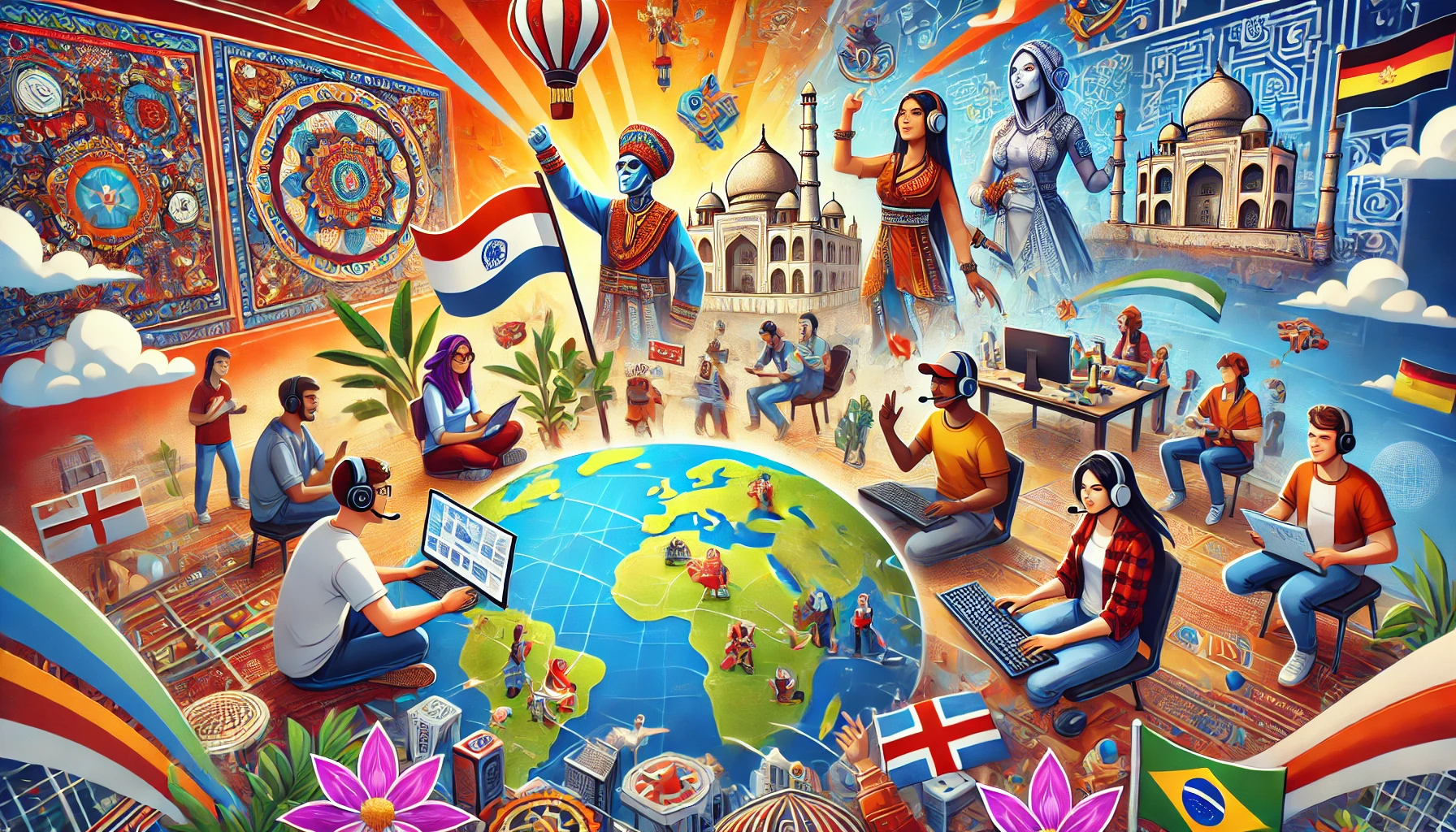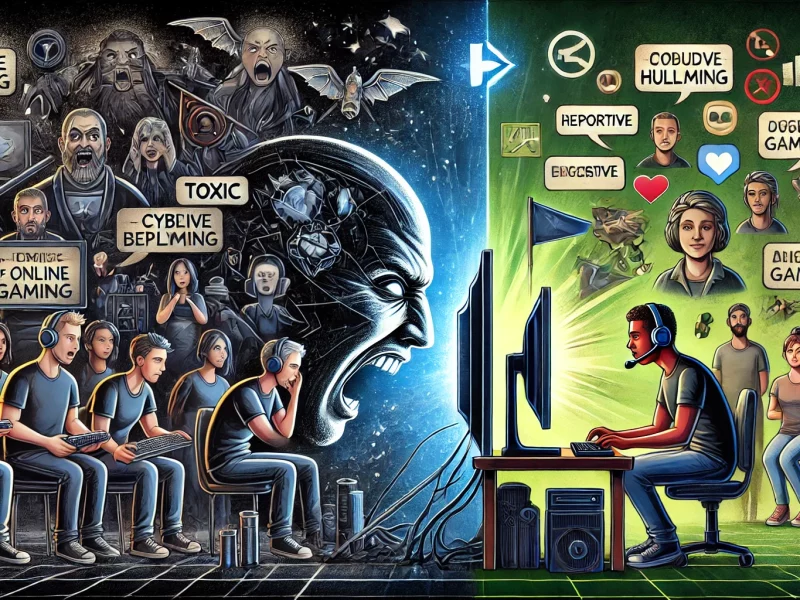The world has become more interconnected than ever, and online gaming has played a significant role in bringing people from different cultures together. From multiplayer role-playing games (RPGs) to competitive esports, gaming platforms have become virtual meeting places where players from all over the globe interact, collaborate, and share experiences.
Online games are not just about entertainment; they are also a gateway to cultural exchange. Players can learn about different traditions, languages, and perspectives simply by engaging in global gaming communities. This article explores how online games foster cultural diversity, the benefits of cross-cultural interactions, and how game developers incorporate cultural elements into their creations.
1. How Online Games Connect People Across Cultures
Gaming as a Global Platform
Unlike traditional social platforms, online games provide immersive environments where players actively engage with one another. Popular multiplayer games like Fortnite, League of Legends, and World of Warcraft bring together millions of players from different backgrounds, allowing them to communicate and form friendships beyond borders.
In these games, players interact through:
- Team-based gameplay requiring collaboration between individuals from various cultures.
- In-game chat and voice communication, where players learn new languages and slang.
- Virtual marketplaces, where gamers trade and exchange in-game items, mirroring real-world global commerce.
Bridging Cultural Gaps Through Collaboration
One of the most fascinating aspects of online gaming is the teamwork involved. Many games require players to strategize and cooperate with teammates from different countries. This fosters an understanding of diverse perspectives, improves communication skills, and breaks down cultural barriers.
For instance:
- In MMORPGs (Massively Multiplayer Online Role-Playing Games) like Final Fantasy XIV, players often join international guilds, working together to complete quests and build strong in-game communities.
- In esports titles like Counter-Strike: Global Offensive (CS:GO) and Valorant, teams consist of players from different continents who must coordinate effectively to win matches.
By playing together, individuals learn to appreciate different working styles, leadership approaches, and social norms, which can translate to real-world cross-cultural understanding.
2. Representation of Cultures in Online Games
Incorporating Cultural Elements in Game Design
Game developers increasingly recognize the importance of cultural representation in their designs. Many modern games feature:
- Mythologies and folklore from various countries.
- Traditional clothing and architecture inspired by real-world locations.
- Languages, accents, and dialogue choices reflecting different cultures.
For example:
- Assassin’s Creed series explores historical settings such as Ancient Egypt, Renaissance Italy, and Feudal Japan, providing players with insights into these cultures.
- Ghost of Tsushima accurately represents samurai traditions and Japanese feudal history.
- Genshin Impact introduces regions inspired by China, Japan, Germany, and other cultures, each with unique traditions and aesthetics.
Challenges in Cultural Representation
While cultural diversity in games is growing, there have been cases where misrepresentation or stereotypes have caused controversy. Developers must carefully research and consult with cultural experts to ensure respectful and accurate portrayals.
Games like Horizon Zero Dawn and The Witcher have been praised for their rich world-building and cultural inspiration, while some games have faced criticism for cultural appropriation or inaccuracies.
3. Learning Languages and Traditions Through Gaming
Multilingual Communities in Online Games
One of the biggest advantages of online gaming is language exposure. Many players improve their language skills through in-game interactions without even realizing it.
- Players in MMOs and open-world games often communicate in English as a universal gaming language, helping non-native speakers practice their skills.
- Some games, like Duolingo’s RPG-inspired language-learning app, are specifically designed to teach languages through interactive gameplay.
- Voice chats and text-based discussions introduce players to slang, idioms, and cultural expressions unique to different countries.
Festivals and Cultural Events in Games
Many online games celebrate real-world festivals, allowing players to experience different traditions virtually.
- Overwatch and Animal Crossing have seasonal events inspired by global holidays like the Lunar New Year and Halloween.
- World of Warcraft hosts in-game festivals mirroring real-world celebrations such as Oktoberfest and the Mid-Autumn Festival.
- Fortnite collaborates with global artists, hosting virtual concerts that showcase diverse music genres.
These events give players a chance to learn about cultural traditions in a fun and interactive way.
4. Challenges and Opportunities in a Multicultural Gaming Space
Overcoming Cultural Stereotypes and Bias
Despite the positives, online gaming communities sometimes struggle with cultural misunderstandings or biases. Some challenges include:
- Stereotyping certain nationalities or ethnicities within gaming communities.
- Language barriers leading to miscommunication or frustration among players.
- Toxicity in online chats, where cultural differences may lead to conflicts.
However, many gaming platforms are taking steps to foster inclusivity:
- Moderation tools help prevent discrimination or hate speech.
- Diverse character representation allows players to see themselves reflected in the game world.
- Cultural sensitivity training for developers ensures respectful portrayals of different cultures.
Opportunities for Gamers to Become Global Citizens
By embracing cultural diversity in gaming, players can develop valuable real-world skills such as:
- Empathy and adaptability, by understanding different viewpoints.
- Cross-cultural communication, which is useful in international careers.
- Problem-solving in diverse teams, mirroring global workplace dynamics.
In essence, online gaming serves as an informal cultural exchange program, where individuals can learn about different cultures without leaving their homes.
5. The Future of Cultural Diversity in Online Gaming
As the gaming industry continues to evolve, we can expect even greater cultural diversity in:
- More inclusive storytelling, where diverse protagonists take center stage.
- Improved AI-driven translations, helping players overcome language barriers in real-time.
- Expanding metaverse experiences, where virtual worlds can simulate different cultures with greater accuracy.
Developers, players, and communities all play a role in making online gaming a more inclusive and culturally rich experience. You will find good games on this site 1winua.com.ua.
Conclusion
Online gaming has become more than just a form of entertainment—it’s a powerful tool for cultural exchange and global connection. By playing games with people from different backgrounds, exploring culturally rich game worlds, and participating in multilingual interactions, gamers can develop a deeper appreciation for diversity.
As gaming technology continues to advance, the opportunities for cultural learning and inclusion will only grow. Whether you’re teaming up with players from another country, exploring a game based on a real-world location, or learning a new language through in-game chat, online games have the potential to bring people together like never before.
So the next time you log into your favorite game, take a moment to appreciate the cultural diversity around you—you might just learn something new!


